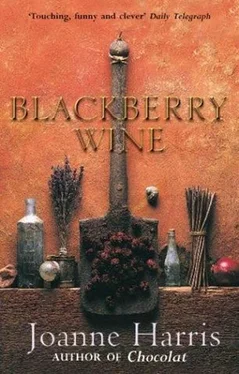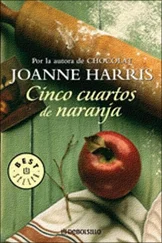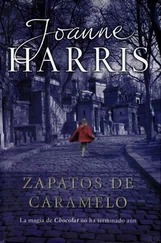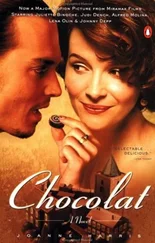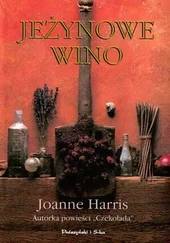‘Didn’t I ever tell you about Arnauld and the truffle pig? Or the time Armande dressed up as the Immaculate Conception and laid in wait for him in the churchyard? Listen…’
There were many stories of her best friend, Vianne, who left some years ago, and of people long dead, whose names meant nothing to him. But Joséphine was persistent. Perhaps she, too, was lonely. The morning habitués of the café were a silent lot for the most part, many of them old men. Perhaps she welcomed a younger audience. Little by little the ongoing soap opera of Lansquenet-sous-Tannes drew him in.
Jay was aware he was still an oddity here. Some people stared at him in frank curiosity. Some smiled. Most were reserved, politely dour, a nod in greeting and a sidelong glance as he walked past. Most days he called at the Café des Marauds for a blonde or a café-cassis on the way back from Poitou’s. The walled terrasse was small, no more than a wide piece of pavement on the narrow road, but it was a good place to sit and watch as the village came to life. Just off the main square, it was a vantage point from which everything was visible: the long hill leading down towards the marshes; the screen of trees above the Rue des Francs Bourgeois; the church tower whose carillon rang out across the fields at seven every morning; the square, pink school-house at the road’s fork. At the bottom of the hill the Tannes was hazed and dimly gleaming, the fields beyond barely visible. The early sunlight was very bright, almost crude in comparison, cutting out the white fronts of the houses against their brown shadow. On the river a boat was moored, close to the huddle of derelict houses which overhung the river on their precarious wooden stilts. From the boat’s chimney he could see a scrawl of smoke and smell frying fish.
Between seven and eight o’clock several people, mostly women, passed by carrying loaves or paper bags of croissants from Poitou’s bakery. At eight the bells rang for Mass. Jay always recognized the churchgoers. There was a look of solemn reluctance to their good spring coats, their polished shoes, their hats and berets, which defined them. Caro Clairmont was always there with her husband; he awkward in his tight shoes, she elegant in a series of silk scarves. She always greeted Jay as she passed, with an extravagant wave and a cry of, ‘How’s the book?’ Her husband nodded briefly and hurried by, hunched, humble. While Mass was in progress, a number of old men parked themselves with tired defiance on the terrasse of the Café des Marauds to drink café-crème and play chess, or talk among themselves. Jay recognized Narcisse, the market gardener, always in the same place by the door. There was a tattered seed catalogue in his coat pocket, which he read in silence, a cup of coffee at his elbow. On Sundays Joséphine bought pains au chocolat and the old man always took two, his big brown hands oddly delicate as he lifted the pastry to his mouth. He rarely spoke, contenting himself with a brief nod in the direction of the other customers before settling in his usual place. At eight thirty the schoolchildren began to pass, incongruous in their anoraks and fleeces, a procession of logos against purple, scarlet, yellow, turquoise, lime-green. They looked at Jay with open curiosity. Some of them laughed and called out in cheery derision, ‘ Rosbif! Rosbif! ’ as they dashed by. There were about twenty children of primary-school age in Lansquenet, divided into two classes; the older ones had to take the school bus into Agen, its windows snubbed with curious noses and thick with finger-graffiti.
During the day Clairmont had been overseeing the repairs to the house. Already the ground floor looked better and the roof was almost completed, though Jay could tell Georges was disappointed at his lack of ambition. Clairmont dreamed of conservatories and indoor swimming pools, Jacuzzis and piazzas and landscaped lawns, though he was philosophical enough when Jay told him that he had no ambition to live in a St Tropez villa.
‘Bof , ce que vous aimez, à ce que je comprends, c’est le rustique,’ he told Jay with a shrug. Already there was a speculative look in his eyes. Jay understood that if he didn’t take a hard line with the man he would almost certainly be deluged with unwanted objects – broken crockery, milking stools, bad reproduction furniture, walking sticks, cracked tiles, chopping boards and ancient farming utensils; all the unloved and abandoned detritus of loft and cellar, granted reprieve from the bonfire by the call of le rustique - which he would then be expected to buy. He should have withered him on the spot. But there was something rather touching about the man, something both humble and absurdly hopeful in the ratty black eyes gleaming above the drooping moustache, which made it impossible.
Sighing, Jay resigned himself to the inevitable.
On Thursday he caught sight of Marise for the first time since their initial, brief meeting. He was coming home after his morning walk, a loaf tucked under his arm. At the point at which his field backed onto hers there was a blackthorn hedge, along which a path ran parallel to the boundary. The hedge was young, three or four years at the most, the new March growth barely sufficient to form a screen. Behind it he could see the broken line where the old hedge had been, an uneven row of stumps and tussocks imperfectly hidden by a new furrow. Mentally Jay calculated the distance. Clairmont had been right. She had moved the boundary by about fifty feet. Probably when the old man first fell ill. He looked more closely through the hedge, faintly curious. The contrast between her side and his was striking. On the Foudouin side the vines were sprawling and untrimmed, their new growth barely showing, except for a few hard brown buds on the ends of the tendrils. Hers had been cut back hard, twelve inches from the ground, in readiness for the summer. There were no weeds on Marise’s side of the hedge; the furrows neat and clean-edged, a path running along each row wide enough to allow easy passage for the tractor. On Jay’s side the rows had run into each other, the uncut vines clinging lasciviously to one another across the paths. Gleeful spikes of ragwort, mint and arnica poked through the tangle. Looking back towards Marise’s land, he found that he could just see the gable-end of her farm at the edge of the field, screened from full view by a stand of poplars. There were fruit trees there, too – the white of apple blossom against bare branches – and what might be a vegetable garden. A woodpile, a tractor, something else which could only be the barn.
She must have heard the shot from the house. She had put the baby in the crib. Gone out. Taken her time. The image was so vivid that Jay could almost see her doing it: pulling on her boots over thick socks, the oversized jacket around her shoulders – it was winter – the frosty soil crunching under her feet. Her face was impassive, as it had been when they met that first morning. The image haunted him. In this guise Marise had already walked more than once across the pages of his new book; he felt as if he knew her, and yet they had barely spoken. But there was something in her which drew him, an irresistible air of secrecy. He wasn’t sure why she made him think of Joe. That coat, perhaps, or the man’s cap jammed too far over her eyes, that confusing half-familiar silhouette just glimpsed behind an angle of brick. Certainly there was no resemblance to Joe in her features. Joe could never have had that bleak, empty face. Half turning to go, Jay caught sight of something – a figure moving quickly along the other side of the hedge a few hundred yards from where he was standing. Shielded by the thin screen of bushes, he saw her before she caught sight of him. It was a warm morning and she had shed her bulky outer clothes in favour of jeans and a striped fisherman’s jumper. The change of clothing made her boyishly slender. Her red hair had been cut off inexpertly at jaw level – Jay guessed she’d probably done it herself. In that unguarded moment her face was vivid, eager. For a moment Jay barely recognized her.
Читать дальше
